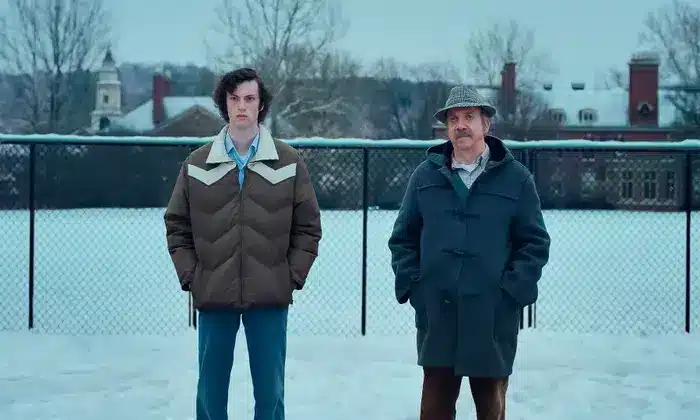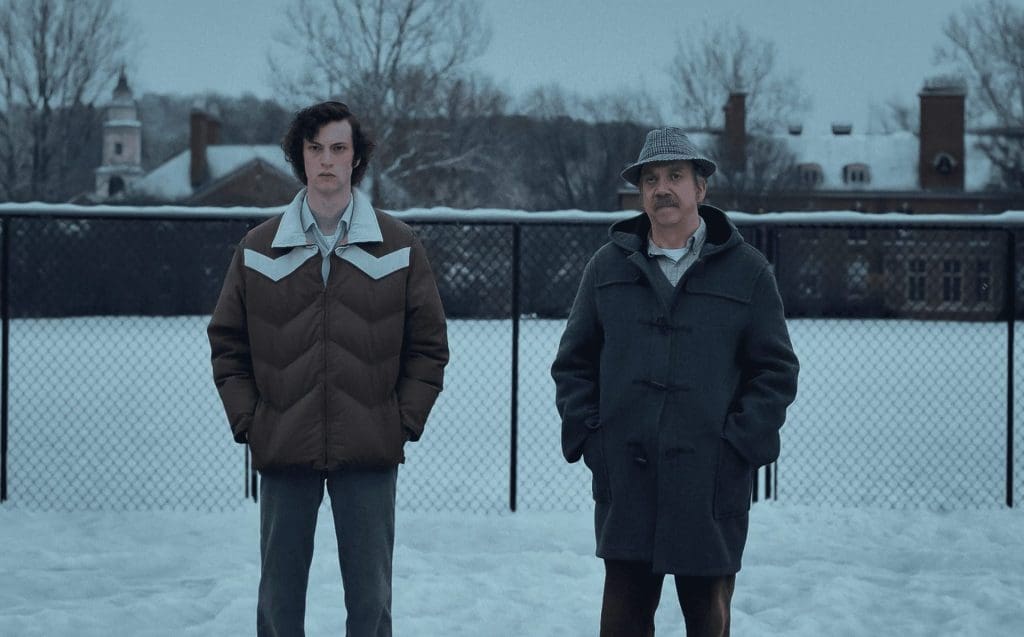
When it comes to contemporary road movies, there are few filmmakers that have played a bigger part than Alexander Payne. Through three particular films (Sideways, About Schmidt and Nebraska) Payne has been one of the great illustrative filmmakers in America, showing us what’s going on between the ears of modern America and a side to the country that we don’t often see. His films are optimistic and engaging despite dealing with the emotionally repressed and dangerously disappointed. They are films about people, people stuck in their own lives, at the end of a long line of bad decisions. It could be grieving husbands looking for meaning; a heartbroken divorcee looking for love; or a lonely student simply looking for anything. For his review of Sideways, Roger Ebert concluded with a wonderful summary of the director: “He finds plots that service his characters, instead of limiting them. The characters are played not by…actors who will prevent you from ever being able to imagine anyone else.”

In our meeting at the Soho Hotel, during the London Film Festival, shortly after I had seen his new film, The Holdovers, I found Payne at the end of a long day of interviews. Despite my expectations of what that would mean, I was struck by his curiosity. Payne’s generation of filmmakers came up through the 90s and early 00s, they broke rules and created a whole new language in cinema. Filmmakers like Payne, Sofia Coppola, Wes Anderson, David O Russell, Paul Thomas Anderson and David Fincher were responsible for reinvigorating the film industry in a similar way to Coppola, Scorsese, Spielberg, De Palma, Arthur Penn and others in the 60s and 70s. I’m desperate to lump all these people together, but Payne is more hesitant, “Only because we all came up from the so-called indie films of the 90s and then started making studio movies—but on our own terms or whatever you want to say about it.” He adds Steven Soderbergh and Spike Jonze to the list. Film historians describe this group as “The American Eccentrics”, in opposition to mainstream cinema in both form and content. In Jesse Fox Mayshark’s book, Post Pop Cinema, this group is described as being “deeply concerned with ethics and morality, the obligations of the individual, the effects of family breakdown, and social alienation.” Is it possible that a group of filmmakers can grow up together and change the system in a similar way in this age of streaming? Payne, evasively, throws the question back to me. True to the eccentric spirit, his latest film, The Holdovers, set in 1970, brings together an unlikely trio at Christmas in a New England Boarding School. The film follows a classics teacher, played by Paul Giamatti, who spends the Christmas holiday supervising a student whose mother has decided against taking him for the holidays.
For Paul Giamatti’s companions in The Holdovers, Payne enlisted Da’Vine Joy Randolph and Dominic Sessa. Randolph possesses a quiet authority and a warm heart that proved to be a standout in HBO’s The Idol or Hulu’s Only Murders in the Building. For Sessa, over 800 actors were considered. “Easy to do in today’s world,” Payne explains, “because any Tom, Dick and Harry can put himself on tape and then upload it and press send…we look at everything because you just never know.” Having gone through that process they then called up the schools where they would be shooting to see who’s in the drama department. It was in this second process they discovered the then unknown Sessa. “I’ve never done what, in television, they call chemistry reads”, Payne tells me, “but I did enlist Paul to read with him over Zoom.” The experiment was a success—together Giamatti and Sessa are electric on screen.

To give “a sense of the type of visual vernacular” before shooting, Payne organised a screening series. Not least for its young leading actor, Dominic Sessa, who was unfamiliar with the cinema of the time. It’s worth noting that The Holdovers is not just set in the 70s but feels like it was made in the 70s. Sessa was shown “movies which are much more concerned with character than plot,” starting with The Graduate. (Sessa’s gangly charm is reminiscent of a young Dustin Hoffman.) The fact that Hoffman appears in the film (a clip from Little Big Man features at a crucial point) was nothing but “sort of coincidental.” When asked about the significance of this film, Payne responds: “I just went online and looked up what’s in movie theatres in America in 1970. Lo and Behold there was Little Big Man.” It wasn’t all that cynical though, Payne was a fan: “I was nine and I saw it four times in the cinema. Loved it. Still love it.”
It feels only fitting to ask about road movies at this point. “While I make road movies, I don’t really know why. I’m not necessarily a fan of other road movies.” Though in fact he cites Paper Moon and The Last Detail as personal favourites, the latter being a particular inspiration for his new film. Despite this statement, Payne obviously does have a great and unique ability to execute a classic road movie. In our conversation he explained: “The key to a road movie is people who are stuck who somehow break open through a travel experience,” and from a screenwriting perspective, “a road trip provides episodes—you can think about what happens in those episodes and who those characters are in those episodes and what other facets of them emerge.” Just from those two lines, the whole of Payne’s filmography unfurls. “I highly dislike the antiseptic atmosphere of a sound stage. I’ve done it mercifully little in my career. I like locations.” Although he claims not to have a reason for why he makes road movies, it begins to feel a little clearer.

As previously mentioned, The Holdovers brings Payne back together with the magnificent Paul Giamatti. Watching him spew out gorgeous insults can’t help but remind audiences of their first collaboration, Sideways, in which Giamatti starred alongside a never better Thomas Haden Church, “I just picked those guys separately. The first time they met was the first day of rehearsal but it’s incumbent upon actors to create an understanding if not a bond. But then of course the camera has a wonderful capacity to lie.”
When discussing the beginning of his relationship with Giamatti, whom he recently described as his “spirit animal”, Payne tells me, “I wanted to look at him. I want to make the movies I myself would want to see and I met him at an audition. I wasn’t even that familiar with his work.” Up to that point Giamatti had been, for mainstream audiences, a very reputable and reliable supporting actor in many much loved films from The Truman Show and Saving Private Ryan to Planet of the Apes to Big Fat Liar. For most people however it was Sideways that really made him stand out. “He can make dialogue work. He can make bad dialogue work. That’s the kind of actor you want.” Giamatti’s range: his vulnerability, warmth, frustration, rage and disappointment make him the perfect foil for Payne. I ask whether there had been a possibility of a reunion before this, “Yeah, it would have happened sooner had I been faster on the screenplay front. I’m just not fast on screenplays.” For anyone that doesn’t know Sideways, pour yourself a glass of wine, sit down and watch it immediately.
Sideways is so grounded in a reality that is at times both specific and alien: the world of wine tasting in northern California. And yet the humour and experiences of the characters felt so urgent. Paul Giamatti and Thomas Haden Church play two friends enjoying one last wild weekend. They are going through existential crises, while one (Church) thinks he can get himself out of it by sleeping around, the other (Giamatti) doesn’t quite understand there’s anything to get out of. Part of Giamatti’s journey is the realisation that he is at rock bottom, all perfectly summed up in the title of the novel this character is working on, “The Day After Yesterday”. The bond between these men is so brilliantly translated on screen:they love each other and they hate each other. Above all they really do understand each other, far better than either man understands himself. In the end, we get the sense that Giamatti’s character is going to improve his life, he is going to make choices that are healthy and enhancing. He may even get his book published eventually.
It was in 2002 on the film before Sideways that first brought Payne into the Road Movie genre. About Schmidt, one of Jack Nicholson’s last great roles, follows a recently retired man on a journey to his daughter’s wedding. On his adventure, he learns more about himself and life than he ever thought possible. Warren has moved through the world in a very specific way for a very long time. He is not ungenerous or unpleasant, he tries his best but he is stuck in a life that feels inescapable. In his review of About Schmidt, Roger Ebert conjures one of the greatest road movies of all, also starring Jack Nicholson: “The film puts Schmidt on the road, in a reversal of Nicholson’s youthful journey in Easy Rider. He and the film are in search of life, and find it in his daughter’s plans to marry a man he (correctly) perceives as a buffoon and a fraud.” Prompted by events in his life and an eye-opening journey Warren becomes something else, something new. He discovers, when considering the possibility that his own existence has been worthless, thanks to an act of generosity we see earlier in the film, that he has made a very meaningful change in someone’s life. Through his actions he has improved the lot of a young boy thousands of miles away.

Nebraska makes up the finale of this unofficial trilogy. Another familiar story that sits comfortably along the others but also a totally new refreshing take on the modern American fable. When an ageing father, played by Bruce Dern, discovers he’s won a million dollars in a competition, he enlists his estranged son to take him from Montana to Nebraska to claim the prize. Like Sideways, the film explores the relationship between two disappointed men; like About Schmidt, Nebraska examines the trials, tribulations and opportunities that come in the final chapter of life. Despite the similar cynicism and disappointments that consume the characters in this film, we are left with a real sense of optimism for life. These films celebrate life. What more do you want?
So what’s next for Mr Payne? Will it be another 6 years before his next film? “With age, now that death is coming soon, I’m starting to recognise the value of multi-tasking.” It seems that Payne would love to be more prolific: “It’s what the big boy directors do. Scorsese or Spielberg have 30 things going for them at once. They finish one film and then put on their wellies, go into the field and say ‘what’s ripe, what’s ready?’ And then they pluck that one.” So what will that next film be? I’m surprised to actually get an answer. “David Hemingson [The Holdovers writer] and I are starting to conceive a Western. So I’m steeping myself in some history of the period.”
Immediately I have a vision of Paul Giamatti riding into the West with a large glass of wine.





